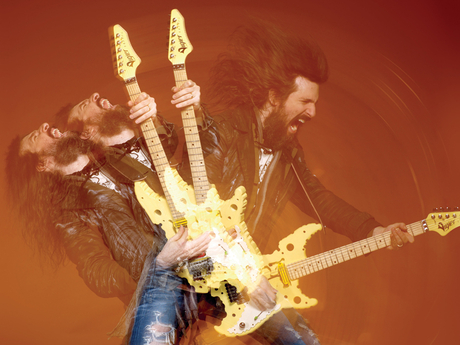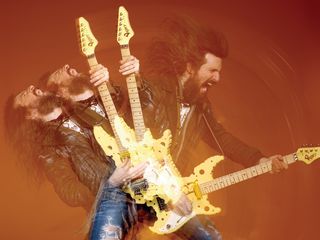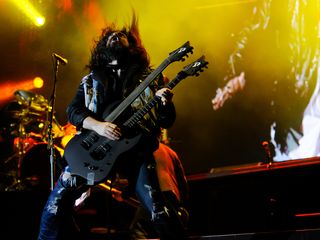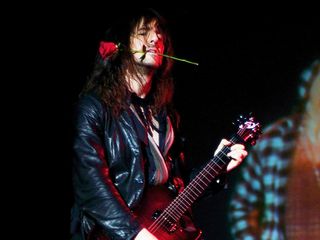

Ron 'Bumblefoot' Thal in a typically subdued, non-rock star moment. © Larry DiMarzio
As a member of Guns N' Roses, Ron 'Bumblefoot' Thal has spent the better part of two years crisscrossing the globe on the Chinese Democracy tour and playing to packed enormodomes. But, for time being, the New Jersey resident, who has called the city of New Brunswick his home for the past 12 years, is enjoying a bit of normalcy in the Garden State.
"I love living in New Jersey," Thal says. "My life here is so different from what people imagine. It's simple and real, which is what I like. Last night, for instance, I took out the garbage. Then, this morning, my cat kept trying to wake me up. That's just real life. You can still make music and be in a big band and lead a regular existence. I've always been close by, whether it was Staten Island or Brooklyn. The East Coast keeps me grounded. I think it helps the music. I know who I am here."
And more and more, millions of music fans are discovering who Thal is, too - and not just because of his high-profile association with Guns N' Roses, which he joined in 2006. The guitarist, singer, songwriter and producer has issued almost a dozen albums as both Ron Thal and 'Bumblefoot' since 1995. During that time, he's also scored themes for TV shows, written music for sports teams and collaborated with artists as disparate as Dream Theater's Jordan Rudess and Jessica Simpson. "It's all part of being a musician," Thal says. "You do what feels right and sounds right. Pop, rock, metal - I love it all."
This much is clear on the latest batch of recordings Thal is releasing, a song at a time on his website (with Player and Producer Packs available). So far, there's the bracing original Invisible, along with fascinating and inventive takes on classic tunes such as Strawberry Fields Forever, Goodbye Yellow Brick Road and the Four Tops' Bernadette.
In addition, Thal has embarked on a unique way of offering guitar lessons to players around the world via Skype. "I thought I'd get a nice response when I announced what I was doing," says Thal. "But the amount of requests I've received has been overwhelming. I take on all comers. Whether you can play great or you're a total beginner, I'm here to help."
Being that you're releasing one song per month via your website, I'm curious to hear your thoughts on the music business in 2011.
Get the MusicRadar Newsletter
Want all the hottest music and gear news, reviews, deals, features and more, direct to your inbox? Sign up here.
"Oh God, where do I even start? We could talk about this for three hours! [laughs] First off, the fact of the matter is that you don't need record labels. They need you, though. Bands always think that labels are going to be the knights in shining armor that ride up to save them. And what happens? Every band I talk to winds up saying the same thing: 'Why did we sign with a label? We could have done so much more by ourselves.' [laughs] It happens all the time.
"Just because a label can do the work doesn't mean they're going to. They might have certain access to media outlets and everything else, but if they're not motivated, if they're not given the signal to push for you, they won't. It's always been like that, but it's never been more true now.
"The other thing to remember is this: Nobody is going to care more about your music than you. So take that to heart and do the right things. You've got one career, one shot, basically. For people at a label, if your band doesn't make it, they're on to something else - even though, as we know, labels are shrinking and going away. They should care more than they do, but they don't. It's weird.
"I remember a time when there was no internet, and you had to go through all the gatekeepers and give them everything. Those days are over. Young bands and musicians have so much power, and it's right at their fingertips. There's things like CD Baby or Topspin, your Facebook page…so many outlets. Beyond that, if you can find a dude who loves to be on the computer and can get your music around via all the social sites, then you've got as much power as a record label, if not more.
"For a musician these days, the two key words are 'digital strategist.' I work with a guy named Ron Scalzo. He's the singer of a band called Return To Earth. Ron started a thing called Bald Freak Music, and we've been working together for about 15 years. He learned his lessons the hard way. Ron and I both discovered that you can do things bigger and better if you simply do them yourself. Of course, I should point out that it helps to have really good music. Don't skimp on the music, folks!" [laughs]

Thal, in concert with his Vigier fretted and fretless doubleneck. © Roldan Macahiya
Recently, I read comments you made in which you stated that music sales are suffering because bands just don't make great albums anymore
"It's true. I think it started when music become devalued. There are so many things that come into play here, so many aspects of the entertainment business and how people are compensated. But if we look at recorded music, when everything went from a beautiful 12-inch by 12-inch square of art that opened up and had dimension, and then it went to a CD to a digital file to streaming links and everything else…with that, we've lost some value. Through all of those changes, the industry has become a tenth of what it used to be.
"As a result, labels don't want to invest in a band's growth. It's gone from a long-term relationship to a quick-fix loan. And if you don't prove yourself fast, you're done. The industry stopped investing in talent. It took many years for this to happen, but when the paradigm totally changed, it did so dramatically. Consequently, we've seen a death in quality. Great bands used to take time to develop - they popped on their third or fourth album. You know that doesn't happen anymore. It's rare for anybody to get a chance to grow on a major label. So, yeah, I think we're in a world where quality isn't encouraged.
"Another part of the problem is, it's become about style over substance, making something that sells versus something that matters. People don't make the masterpieces that they used to make. They're not given the motivation from outside to do so. It's sad."
So how did all of this lead into your decision to release a song per month? Why not do an album, a great album? Or are all of these songs eventually going to be a full-length release?
"I think they will. A lot of people had said to me that they want these songs on an album, so I guess at some point I'll compile everything. With me, right now it all comes down to the investment of time. I have more passion than time right now. So I can't take on a whole album. Plus, with the GN'R schedule, I don't know when the fire alarm is going to go off and I'll have to throw on my suit and slide down the pole. [laughs] It's really hard to focus on making an album. I was able to do that in late 2007 when everybody was getting Chinese Democracy ready for release, but right now…I don't know. I don't want to spend nine months making an album, and it's a big deal for two weeks, and then everybody's going 'OK, where's the next album?'"
I'm just trying to reconcile your comments about the lack of album quality from other artists with the fact that you're not making an actual album yourself.
"I know! [laughs] I'm trying not to contradict myself. I probably should make an album. Well, I have made two that I'm extremely proud of: Normal and Abnormal. I think of those as my masterpieces for the time being. No, at this point, I have to do something that fits into my life, and the best way for me to do that is to keep a constant simmer going on, a song at a time. I can take on these small bites, focusing on one song here, one song there and really zero in on each particular cut, whereas with an album, that would be difficult, at least right now.
"Also, I can do things with each track, like these special Producer and Player Packs - things I couldn't possibly find the time to do with an entire album. So I do think I'm doing something special, something that gives people value for their money. I'm a total studio nerd, and these things are cool. Believe me, if I had gotten these kinds of packs for Queen albums when I was a kid, I never would have left the house!" [laughs]
How did you put together the Producer and Player Packs? Where did you get the idea to do these?
"Basically, I asked people on my forum. I said, 'I'm ready to start making music again after being on the road for two years - what do you want?' I got responses from a lot of guitar players, and I took their thoughts into serious consideration. They're really into transcriptions. So the Player Pack gives them transcriptions of all the leads, along with special mixes, one with the guitars boosted, another with the guitars removed - it's made just for them. The Producer Pack is for people who love the studio, and they can load the songs up and do whatever they want. Boost this, chop that, edit this - do whatever you want." [laughs]
So far, with this new batch of tunes, you've done one original, Invisible, and you've also recorded covers of Strawberry Fields Forever, Goodbye Yellow Brick Road and Bernadette. In the studio, are you doing all the vocals and playing all the instruments?
"I'm doing everything except drums, which are played by Dennis Leeflang. I've played with him for over 10 years. He's terrific. I'm having a good time doing these covers. Over the years, I've put out a ton of originals but very few covers. I love old '60s and '70s music, lounge tunes, classic stuff. A while ago, I did an album called Uncool, which sounded like Tom Jones singing with a metal band. [laughs] I did Delilah and What's New Pussycat? It was a lot of fun.
"It's cool talking about this because so many people only know me as the 'replacement dude.' They don't know I have all these other sides to me and that they've been hearing my music on TV for the last 20 years; that I've done my own albums and tours, and all this stuff. GN'R is just one thing of many that I do. Not to sell it short or anything - it's probably the biggest thing in my life, and it definitely reaches the most people. But I'm not defined by Guns N' Roses. I always done other things. I like keeping my hands in all the pies, I guess." [laughs]
Obviously, lot of people know you from playing with Guns N' Roses. What do you hope some of these fans, many of whom are young, will take away from hearing what you're doing now? Like your cover of Bernadette, for example…
"That's a good question. [pauses] I would hope they would hear that it's an awesome song, and it's a song that can be anything. It can be disco, it can be soul… That's the thing about a great song: you can't break it. And you can express yourself very dramatically with a cover tune if you feel it and put your own personality in it. You don't necessarily have to write a song to reveal part of yourself through it. I did Bernadette as a punky metal song. But it could just as easily have been an acoustic ballad.
"The value of a good song is that it can take on any shape. So if somebody knows me from GN'R and hears me doing Bernadette, hopefully they'll hear the power of a timeless song. And my God, those guys, Holland and Dozier and Holland, they wrote some of the fucking best ever!
"Same goes for Elton John and Bernie Taupin. They've written so many classics. I really liked doing Goodbye Yellow Brick Road, though, and just like I was saying with Bernadette, if I can show some younger players who might just be finding out about me through GN'R what tremendous music is out there, then I'm doing my job. Carrying the torch, passing on the flame, you know?
"I like the intimacy I got on Yellow Brick Road. I take it heavy in some places, but it's got some real delicate shades, too. I put on a clean-sounding, bluesy guitar solo that seems to fit. Again - if you have a great song, you can't destroy it. Well, I guess you could if that was your goal. [laughs] 'Let me do the crappiest version of this song ever.' But, obviously, that's not what I'm shooting for."
What's the status of Guns N' Roses right now?
"Right now we're headlining Rock In Rio in October. I'd love to do more dates later this year. Getting everybody - the band, the crew, the whole production - down there to do one show is a pretty big deal, so it'd be cool to do more shows. But I have to wait and see what everybody says.
"As far as any other plans, I think GN'R fans know that it's not often good to speculate too much because plans change all the time with this band. I only like talking about things that are definite, and right now the only definite thing is Rio."
When you were picked to join Guns N' Roses, did Axl ever tell you what he liked about your playing? Of all the players he could have selected, why you?
[laughs] "I ask myself that all the time: 'Why me? Why me?!' [laughs] No, seriously…I don't know. I don't think he ever told me. Actually, of all things, I think it was because he'd heard a song of mine called I Can't Play The Blues, which was on an old album I did for Shrapnel Records. I guess he liked all the crazy stuff I did on that song. Axl gravitates towards players who don't play all the normal patterns and licks."
Let's talk about your relationship with Vigier Guitars. How many models do you have with them?
"We started off with the Flying Foot guitar, which was a crazy, fun guitar. You bend down the vibrato bar and the wings pop out of the sides. After that, we did a signature model, which is more of a normal guitar with a few modifications, like a DiMarzio Tone Zone pickup in the bridge and a DiMarzio Chopper in the neck. The bar isn't floating; it only bends down. So if you break a string, it stays in tune. Little things like that.
"Plus, it has the hole for the thimble, which is kind of a trademark of mine. What happened was, at one point I discovered I needed more notes [laughs], so I would keep a little thimble on the pinky of my picking hand and I worked out this special technique. Basically, what I do is, I hold the pick with my thumb and index finger, and with my middle and third finger I tap. Then, with my pinky that has the thimble on it, I tap beyond the fretboard. When that metal touches the string, it brings out a note as if you're touching the string. I get an extended reach that way.
"In a later model, they added a killswitch that I needed to play a lot of the Chinese Democracy stuff, some of Buckethead's parts from the album that I had to play live. So we have the two signature models, one with and one without the killswitch. They're called the BFoot Signature Series.
"Vigier made me a custom guitar that I have to say it pretty amazing. It's the doubleneck. Both necks have six strings each, but one neck is fretted and the other is fretless."

Fans throw the darndest things on stage during a Guns N' Roses show! © Marco Campozano
I'm curious: What do you like about playing fretless guitar so much?
"Oh man, the sounds! [laughs] The dissonance and the tones. A fretless guitar allows you a method of expression you can't get on a regular fretted guitar. The way you can pinch a harmonic and draw the note down and make all these changing tones. Plus, you can hit these unisons that are just slightly off. It takes a while to get used to, but once you play a fretless guitar you discover so many tonal variations and crazy things you can do. It's a lot of fun."
I must say, I'm very impressed by your strong work ethic. What do you attribute it to? Where did it come from?
"Well, if you want to be employed - as a musician or anything - I think you should have a strong work ethic and be a together person. That's a rule I've followed since…forever! [laughs] I know the image people have of rock 'n' rollers - that we're always causing trouble and trashing hotel rooms and doing tons of drugs, all that stuff. I've never been about that. Hell, you'll probably find more people wearing suits and working on Wall Street doing drugs than you will rock stars who are into drugs.
"For me, a strong work ethic is… See, it all comes down to honor - honoring yourself and other people. Maybe I'm less rock 'n' roll than I think! [laughs] Actually, it's probably more of an old-school metal thing. The old-school metal songs would preach about not being an asshole. That's a philosophy I totally agree with. Don't try to show people what a dick you can be. Anybody can do that. Show people what a great human being you can be…and then go out and make some music!"
Joe is a freelance journalist who has, over the past few decades, interviewed hundreds of guitarists for Guitar World, Guitar Player, MusicRadar and Classic Rock. He is also a former editor of Guitar World, contributing writer for Guitar Aficionado and VP of A&R for Island Records. He’s an enthusiastic guitarist, but he’s nowhere near the likes of the people he interviews. Surprisingly, his skills are more suited to the drums. If you need a drummer for your Beatles tribute band, look him up.
Most Popular







